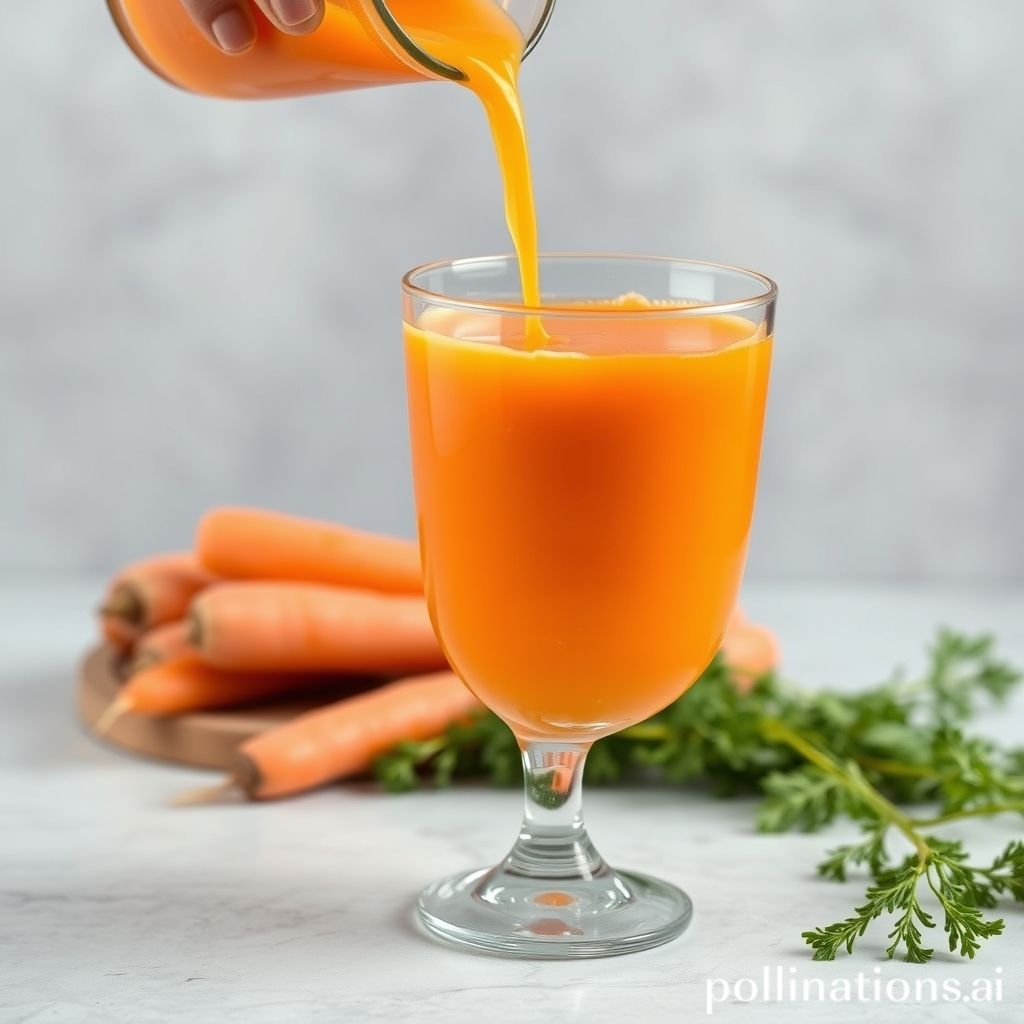Is Carrot Juice Good For Kidneys?
Looking to boost your kidney health naturally? Forget expensive supplements and medications – the answer may be as simple as a glass of carrot juice. With its vibrant color and refreshing taste, carrot juice has been making waves for its potential benefits for kidney health. But is there any truth to the hype?
In this article, we’ll dive into the research-backed evidence on the power of carrot juice for your kidneys. Discover the nutritional content of carrots and how it supports kidney function, and learn how to incorporate this kidney-friendly drink into your diet. Get ready to sip your way to better kidney health!

Table of Contents
The Role of Kidneys in the Body
Functions of the Kidneys
The kidneys have several important functions in maintaining the body’s overall health and well-being. These include:
– Filtration of waste products and toxins from the blood: The kidneys act as filters, removing waste products, toxins, and excess water from the bloodstream. This helps maintain a healthy balance of substances in the body.
– Regulation of fluid and electrolyte balance: The kidneys play a key role in regulating the body’s fluid and electrolyte balance. They help maintain the right amount of water and electrolytes, such as sodium, potassium, and calcium.
– Production of hormones that regulate blood pressure and red blood cell production: The kidneys produce hormones that are essential for regulating blood pressure and stimulating the production of red blood cells. These hormones help maintain stable blood pressure and ensure an adequate supply of oxygen to body tissues.
Importance of Kidney Health for Overall Well-being
Maintaining healthy kidneys is crucial for overall well-being as they support various bodily functions, including efficient removal of waste products and toxins from the body, proper regulation of fluid and electrolyte balance, normal blood pressure control, and adequate production of red blood cells.
Common Kidney Health Issues
Several kidney health issues can affect the proper functioning of the kidneys. These include chronic kidney disease, kidney stones, urinary tract infections, and kidney infections. These conditions may require medical intervention or treatment to manage and prevent complications.
Understanding the role of kidneys in the body and the importance of maintaining kidney health is crucial for overall well-being. However, certain kidney health issues can arise and require appropriate medical care.
Expert Tip: Take care of your kidneys for optimal health. They filter waste, regulate fluids, control blood pressure, and produce essential hormones.Is Carrot Juice Good For Kidneys?
Research-backed evidence on the potential benefits of carrot juice for kidney health
Carrot juice has been studied for its potential benefits in promoting kidney health. Research suggests that the nutrients found in carrots may play a role in maintaining optimal kidney function.
One study published in the Journal of Renal Nutrition found that carrot juice consumption was associated with a lower risk of chronic kidney disease. The antioxidants present in carrots, such as beta-carotene and vitamin C, may help protect the kidneys from oxidative stress and inflammation, which are known to contribute to kidney damage.
Another study published in the International Journal of Food Sciences and Nutrition highlighted the potential renal protective effects of carrot juice. The study found that carrot juice supplementation improved kidney function and reduced oxidative stress in rats with kidney damage.
Nutritional content of carrots and how it supports kidney health
Carrots are packed with essential nutrients that can support kidney health. They are an excellent source of vitamin A, which is important for maintaining the health of the urinary tract and preventing urinary tract infections.
Carrots are also rich in dietary fiber, which can help regulate blood sugar levels and reduce the risk of kidney damage associated with diabetes. Additionally, the high water content in carrots can promote hydration, which is crucial for proper kidney function.
Furthermore, carrots contain potassium, an essential mineral that helps maintain fluid balance and regulate blood pressure. Adequate potassium intake is important for preventing kidney stones and reducing the risk of kidney disease.
Incorporating carrot juice into a balanced diet can be a natural way to promote kidney health.
| Nutrient | Amount per 100g |
|---|---|
| Calories | 41 |
| Carbohydrates | 9.6g |
| Fiber | 2.8g |
| Protein | 0.9g |
| Fat | 0.2g |
| Vitamin A | 835µg |
| Potassium | 320mg |
| Vitamin C | 5.9mg |
Effects of Carrot Juice on Kidney Function
Role of Carrot Juice in Kidney Health
Carrot juice has gained attention for its potential benefits in improving kidney function. Several studies have examined the effects of carrot juice on kidney health, shedding light on its positive impact.
Antioxidant Properties
Carrot juice is rich in antioxidants, such as beta-carotene and vitamin C, which play a crucial role in protecting the kidneys from oxidative stress. These antioxidants help neutralize harmful free radicals and reduce inflammation, thereby promoting kidney health.
Detoxification and Waste Removal
The kidneys are responsible for filtering waste products from the blood. Carrot juice contains compounds that support the detoxification process and aid in the elimination of waste materials. This can potentially enhance kidney function and overall renal health.
Blood Pressure Regulation
High blood pressure is a common risk factor for kidney disease. Carrot juice is known for its ability to help regulate blood pressure levels due to its potassium content. By maintaining healthy blood pressure, carrot juice may indirectly contribute to better kidney function.
Hydration and Kidney Function
Proper hydration is essential for optimal kidney function. Carrot juice, with its high water content, can contribute to adequate hydration, supporting the kidneys in their filtration process and preventing the formation of kidney stones.
Nutrient Support
Carrot juice is packed with essential nutrients like vitamin A, vitamin K, and potassium, which are vital for kidney health. These nutrients help maintain the integrity of kidney tissues and support their proper functioning.
Considerations and Precautions
While carrot juice can be beneficial for kidney health, it is important to consume it in moderation as part of a balanced diet. Individuals with certain medical conditions, such as kidney stones or diabetes, should consult their healthcare provider before making significant dietary changes.
To summarize, carrot juice may have positive effects on kidney function. Its antioxidant properties, detoxification support, blood pressure regulation, hydration benefits, and nutrient content contribute to its potential renal health benefits. However, it is important to approach dietary changes with caution and seek professional advice when needed.

Is Carrot Juice Good For Kidneys?
Incorporating Carrot Juice into a Kidney-Friendly Diet
| Tips on how to include carrot juice in a kidney-friendly diet |
|---|
|
| Other foods and beverages that complement carrot juice for optimal kidney health |
|
Precautions and Considerations
Potential Risks and Side Effects
Consuming carrot juice can have potential risks and side effects for individuals with kidney issues. It is important to be aware of certain considerations when incorporating carrot juice into your diet.
- High Potassium Levels: Carrot juice contains a significant amount of potassium, which may be problematic for individuals with kidney problems. High levels of potassium can lead to irregular heartbeats and other complications.
- Increased Oxalate Levels: Carrots contain oxalates, which can contribute to the formation of kidney stones in susceptible individuals. Consuming large amounts of carrot juice may increase the risk of kidney stone formation.
- Interference with Medications: Carrot juice may interact with certain medications used to manage kidney issues. It is crucial to consult a healthcare professional to ensure there are no negative interactions between carrot juice and any prescribed medications.
Consulting a Healthcare Professional
Before making any dietary changes, especially if you have kidney issues, it is highly recommended to consult a healthcare professional. They can provide personalized advice and guidance based on your specific health condition and medical history. A healthcare professional, such as a doctor or a registered dietitian, can evaluate your kidney function and determine whether consuming carrot juice is suitable for you.
Seeking professional advice can minimize any potential risks or side effects associated with carrot juice consumption. They can also help you create a well-balanced diet plan that takes into account your kidney health and any dietary restrictions you may have.
Remember, everyone’s health needs are unique, and what works for one person may not work for another. Prioritizing your kidney health and seeking professional guidance will help you make informed decisions about your diet and overall well-being.
Conclusion
Incorporating carrot juice into a kidney-friendly diet can provide numerous benefits for kidney health. Research suggests that carrot juice may improve kidney function and overall well-being. However, it is important to consult with a healthcare professional before making any dietary changes, especially for individuals with kidney issues or those on dialysis.
While carrot juice can be a valuable addition to a kidney-friendly diet, individual needs and medical advice should always be considered to ensure optimal kidney health.
Faq about Carrot Juice and Kidney Health
FAQ 1: Can carrot juice cure kidney disease?
No, carrot juice cannot cure kidney disease. While it contains essential nutrients for kidney health, it cannot reverse or cure the disease.
FAQ 2: How much carrot juice should I drink for kidney health?
There is no specific recommended amount of carrot juice for kidney health. It is advised to consume carrot juice in moderation as part of a balanced diet.
FAQ 3: Are there any risks associated with drinking carrot juice for kidney health?
Drinking carrot juice in moderation is generally safe for kidney health. However, excessive consumption can increase blood sugar levels due to its natural sugar content. People with diabetes or other health conditions should consult their healthcare provider before consuming large amounts of carrot juice.
FAQ 4: Can individuals on dialysis consume carrot juice?
Individuals on dialysis should consult their healthcare provider before consuming carrot juice or making significant dietary changes. Dialysis patients often have specific dietary restrictions, and professional guidance is important.
FAQ 5: What are some alternatives to carrot juice for kidney health?
Some alternatives to carrot juice for kidney health include cucumber or beet juice, drinking plenty of water, and following a balanced diet with a variety of fruits and vegetables. It is recommended to consult with a healthcare professional for personalized recommendations based on individual health needs.

